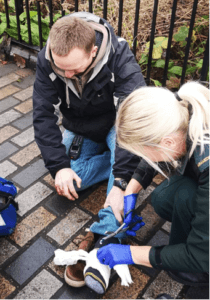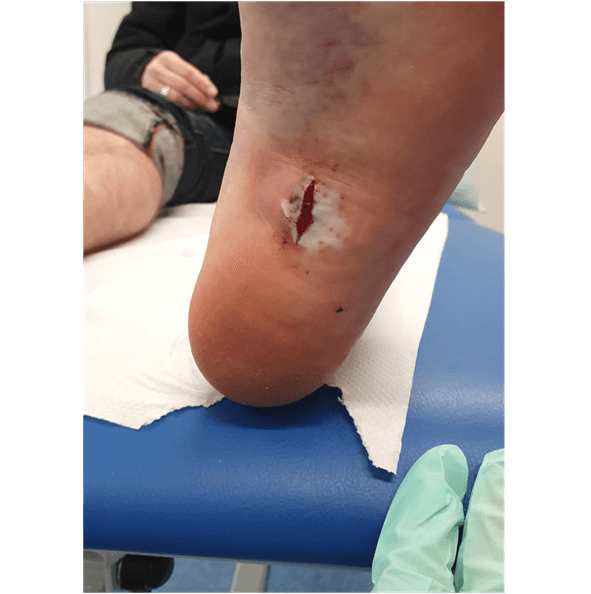PC Matt Jackson’s foot injury (above) – incurred when chasing after someone and discovering that the metal spikes on the fence he was clambering over were positioned halfway up as well as on the top – gives us the ideal opportunity to discuss sepsis. All Bobbies should have an awareness of this life-threatening condition not only because, as Matt demonstrates, our job provides us with ample opportunity to hurt ourselves, but because we regularly come in contact with members of the public who might be injured or sick and not realise just what danger they are in from infection. Below is some information about sepsis from our wonderful NHS to which I’ve added notes in italics to highlight information of particular interest to the Bobby.
- Sepsis is a life-threatening reaction to an infection.
- It happens when your immune system overreacts to an infection and starts to damage your body’s own tissues and organs.
Note. So let’s be clear, it doesn’t need to be an infection caused through a break in the skin; any general infection could lead on to sepsis under the right conditions.
- You cannot catch sepsis from another person.
- Sepsis is sometimes called septicaemia or blood positioning.
Spotting Sepsis.
- Sepsis can be hard to spot. There are lots of possible symptoms.
- Symptoms can be vague. They can be like symptoms of other conditions including flu or a chest infection.
And Police Officers, in their day to day interactions with the public, would do well to note that …
Sepsis Can Be Especially Hard To Spot In:
- Babies and young children.
- People with dementia.
- People with learning difficulties.
- People who have difficulty communicating.
- Some symptoms of sepsis which need quick-time examination are:-
- Acting confused, slurred speech or not making sense.
- Blue, pale or blotchy skin, lips or tongue.
- A rash that does not fade when you roll a glass over it, the same as meningitis.
- Difficulty breathing, breathlessness or breathing very fast.
They may not have all these symptoms.
Act quickly if …
You, your child or someone you look after: (… like a prisoner in custody …)
- feels very unwell or like there’s something seriously wrong
- has not had a pee all day (for adults and older children) or in the last 12 hours (for babies and young children)
- keeps vomiting and cannot keep any food or milk down (for babies and young children)
- has swelling, redness or pain around a cut or wound
- has a very high or low temperature, feels hot or cold to the touch, or is shivering
Do not worry if you’re not sure if it’s sepsis – it’s still best to call 111. They can tell you what to do, arrange a phone call from a nurse or doctor, or call you an ambulance.
Who’s More Likely To Get Sepsis?
- Anyone with an infection can get sepsis.
- Some people are more likely to get an infection that could lead to sepsis, including:
- Babies under 1, particularly if they’re born early (premature) or their mother had an infection while pregnant.
- People over 75.
- People with diabetes.
- People with a weakened immune system, such as those having chemotherapy treatment or those who recently had an organ transplant.
- People who have recently had surgery or a serious illness.
- Women who have just given birth, had a miscarriage or an abortion.
Treatment For Sepsis.
Sepsis needs treatment in hospital straight away because it can get worse quickly.
You should get antibiotics within 1 hour of arriving at hospital
… and that’s a factor that should be in the forefront of your mind should you arrive in A&E to discover it rammed as usual. Make it known to staff that you are concerned about sepsis and that you are aware of NHS guidelines about the need for antibiotics within an hour … tell them the symptoms of sepsis that you, your nearest and dearest, or even your prisoner are suffering.
If sepsis is not treated early, it can turn into septic shock and cause your organs to fail. This is life threatening.
… you better believe it is. According to the Royal College Of Nursing website …
‘The number of people developing sepsis is increasing, with around 123,000 cases each year in England. An estimated 37,000 deaths are associated with the condition (NHS England) …’.
So that’s a ONE IN FOUR mortality rate for sepsis, or if you want to go with the figures from a NICE report from 2015 …
‘Sepsis is common and deadly and is a major cause of death from infection through shock and multiple organ failure. It has a mortality rate of 36%, which rises 8% for every one-hour delay in treatment …’.
Wow!

Luckily, Matt, despite the spike going halfway through his foot has recovered as a result of the wound being bathed in iodine and having a fortnight of sick leave. Hopefully, this article might encourage you to take seriously any injuries that you pick up at work, and infections generally, even if that does mean spending time at A&E that you would rather not!
There’s more advice about infection for the working Bobby in our book ‘How To Survive Your Police Career’, available in hardback or electronic copies.
